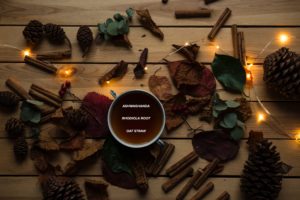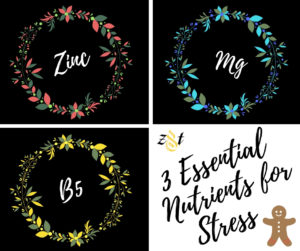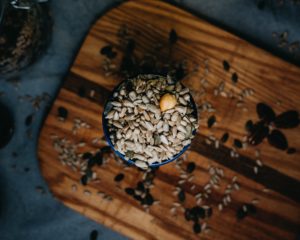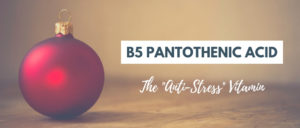Make the Holidays Jolly and Stress Free !
As the holidays grow closer, are you set in overdrive trying to complete all your work? Rushing to fulfill Christmas shopping or sleep deprived after all those holiday parties? Don’t let the pressure of this merry season wear you down or set you up for exhaustion over the holidays. Instead, understand how to support your body and stay jolly this holiday season!
In our last blog, we discussed Adaptogen herbs and how they support your body & adrenals (glands that regulate stress hormones) through times of stress. We also provided you with our favorite de-stressing tea recipe and 10 key stress management techniques to get you through the holiday stressors. If you missed it –check it out!
In addition to these suportive Adaptogen herbs, it is important to understand that during times of chronic stress your body relies on & exhausts key nutrients to fuel your body. When you run on overdrive for a prolonged period, nutrients can easily become depleted. As a result, secondary symptoms arise such as reduced energy, insomnia, digestive & emotional imbalances, and the inability for your body to successfully cope with even the easiest demands.
In this blog, we will understand the three key nutrients in supporting your body through stress and this holiday season. As well as the most effective ways to increase their intake; specifically through diet, herbs and supplementation.
During times of stress your body initiates specific “life-saving” mechanisms so that you can out run that tiger…or in this case, get everything done before the in-laws arrive. Some of these stress reactions include; secretion of cortisol, increased heart rate, increased blood pressure, interrupted digestion, inflammation and much more. These stress responses require increasing amounts of nutrients and put a large pressure on the adrenals, the nervous system as well as the musculatory system. Thus, with chronic stress, key nutrients must be replenished in the body. The three most important nutrients include:
- Magnesium
- Zinc
- Vitamin B5
Over time, these key nutrients can become depleted and lead to other concerns such as weakened immune system, muscle tension, chronic fatigue, insomnia, abnormal blood clots, light headedness, digestive disturbances and more. It is important to understand that during times of chronic stress, your body requires more of these nutrients. Thus, nourish your body with the goodness it needs from whole food sources or quality supplementation.

Let us begin with Magnesium. Magnesium is an essential nutrient that is vital in over 300 biochemical reactions in the body. Often referred to as the “Anti-stress” mineral, it is vital in the regulation of our body’s ability to effectively respond to stress. Unfortunately, magnesium is chronically deficient in many parts of the world as it is easily flushed out of our system through sweating, birth control pills, alcoholism, diarrhea, antibiotics, sweating, stress, anxiety, and poor nutrition. Understand what could be affecting your levels and supplement if necessary.
What does Magnesium do for the human body?
- Maintains muscle and nerve function
- Supports optimal bone structure
- Used in energy production
- Essential in protein synthesis
- Supports blood glucose controls
- Aids in the regulation of blood pressure
- Needed for healthy blood vessels
- And much, much more!
8 Signs of Magnesium Deficiency:
- Nausea
- Restlessness & Insomnia
- Muscle cramping
- Restless legs (mainly at night)
- Weakness
- Anxiety & Irritability
- Tingling and numbness
- Loss of appetite & craving for chocolate
8 Food sources of Magnesium:
- Hemp Seeds
- Pumpkin seeds
- Spinach
- Lima Beans
- Organic figs
- 85% or darker organic Chocolate
- Brown rice
- Avocados
There are MANY different sources of Magnesium available for purchase. Be sure to understand the differences as I truly believe that when it comes to supplements, you really do pay for what you get. Be sure to purchase a supplement that not only supports your needs but is also readily absorbable in the body.
Best Supplementation Forms of Magnesium:
- Glycinate: easily absorbed, used for relaxation, stress relief and to improve sleep. May also help to improve leaky gut syndrome. Best taken before bed.
- Threonate: amazing for brain health, memory, post-concussion syndrome, depression, anxiety and other neurological disorders as this is one of the only nutrients that can bypass the blood brain barrier.
- Chloride: most absorbable and best topical version of Magnesium, found in abundance in ocean water and can be found in Zen & Tonics bath salts and magnesium oil to provide immediate relaxation to muscles and sore bodies
- Malate: can reduce muscle pain and improve energy levels
- Oxide: helpful in supporting healthy cholesterol and blood pressure levels as well as relieving constipation
Worst Form of Magnesium:
- Aspartate or Glutamate: in excess amounts can cause ‘excitotoxicity’
- Oxide: often found in multi-vitamins, not well absorbed
- *** Citrate used for a prolonged period of time. I note this as citrate is often recommended by doctors to alleviate constipation and restless legs, particularly in pregnant women, which it can. However, over a long period of time, as Magnesium citrate pulls water into the intestines it can in fact cause dehydration and potentially cause mineral imbalances or deficiencies. Furthermore, arsenic has been found in multiple Magnesium citrate supplements. (read more)

The second core nutrient that becomes depleted during times of stress is, ZINC! Zinc is vital to homeostasis as it plays a large role in our immune system, cellular maturation and sexual function! It is easily depleted and deficient not only during chronic stress, but also through use of birth control, chemical intoxication (such as copper), diets high in simple carbohydrates, and prolonged illness. Athletes, vegans and strict vegetarians are often susceptible to lower levels of zinc. As our men with prostate problems, low sperm count or delayed sexual maturity. You know that saying? …. Zinc for the dink!
What does Zinc do for the human body?
- Supports immunity
- Key component in stomach acid
- Responsible for taste and smell senses
- Supports wound healing
- Helps regulate insulin
- Aphrodisiac
- Needed for sexual function
- Important in chemical detoxification
- DNA creation
- And much more!
7 Signs of Zinc Deficiency:
- Loss of taste or smell
- Pour wound healing
- Increase in illness frequency
- Men: low sperm count
- White spots & brittle nails
- Diarrhea
- White coating on tongue
- Acne or eczema prone skin
8 Food sources of Zinc:
- Oysters
- Lentils & Chickpeas
- Organic dark chicken meat
- Hemp seeds
- Oats
- Shiitake Mushrooms
- Grass fed beef & lamb
- Eggs
***Zinc is water soluble, thus canned foods or boiling often depletes foods of zinc.
Best Supplementation Forms: as Zinc is not easily absorbed by the body, it is important to understand which supplements are the most bio-available to ensure your body is actually absorbing the Zinc you take. To efficiently absorb zinc, it must first be attached to another molecule and charged– called chelation.
- Picolinate: This is a chelated form of zinc as it is attached to picolinic acid. This is the easiest and most bio-available form of Zinc.
- Gluconate: another chelated form of zinc, and is more easily absorbed in the body.
Worst Forms of Zinc:
- Sulfate: often the most affordable and readily available form of Zinc, however also the least absorbable. It is also rather hard on the body and can cause upset stomach or other negative side effects.
- Oxide: not a form of chelated zinc, thus less bio-available in the body. Often used in sunscreen.
***Do not take Zinc at the same time as an Iron supplement as they compete for absorption. Zinc is also best taken with protein as it has been known to cause nausea without.

Vitamin B5, also known as Pantothenic acid, is the third recommended supplement to take during times of chronic stress. B5, often referred to as the “anti-stress vitamin” as it is essential in the creation of stress hormones by the adrenals. B5 is also critical in our body’s ability to utilize fat & carbohydrates in energy production – enabling us to deter that “burnout feeling” you get with adrenal fatigue or all that holiday prep!
What does B5 do for the human body?
- Forms sex and stress-related hormones
- Helps create red blood cells
- Aids in cholesterol synthesis
- Supports healthy digestion
- Synthesis of fatty acids
- Essential for energy metabolism
8 Signs of B5 Deficiency:
- Teeth Grinding
- Fatigue
- Insomnia
- Depression
- Irritability
- Upper respiratory infections
- Dizziness
- Digestive problems
8 Food sources of B5:
- Shiitake mushrooms
- Salmon
- Avocados
- Organic Chicken
- Sunflower seeds
- Sweet potatoes
- Lentils
- Organic Eggs
B5 supplementation: *As all B vitamins are water soluble, you can only absorb so much before they are eliminated through urine. Thus, supplementing B vitamins and B5 throughout the day is ideal if you are deficient. To add, B5 can also be created through your body’s own bacterial flora. However, with digestive disturbances, multiple rounds of antibiotics, an acidic diet or high sugar intake, this function can become damaged.
Best Form: most all forms of B5 come from Calcium Pantothenate. Another great form, is consuming a high quality B complex to ensure your intake of all essential B vitamins. This is my favourite!
During or after times of high stress, supplementation of these key nutrients is often extremely beneficial in supporting your body back to a state of balance and optimal health. Understanding your unique dosaging needs is extremely important to ensuring that you are correcting the deficiencies or not over-supplementing. Don’t know how much you need or what supplement is best? Come in to Zen & Tonic and talk to our nutritionist about the perfect supplementation for you!
In addition to these 3 supplements, adding more mineral salt and increasing your intake of healthy, unsaturated fats, such as Omega 3 and DHA can also be extremely effective in relieving the symptoms of stress. (read about healthy fats in this blog!)Your adrenals need fat to create the stress hormones they secrete, as well as sodium for proper functioning. In regards to salt, focus on mineral salts such as Himalayan pink salt or sea salt. Avoid table salt and salt from packaged or fast food.
This holiday season, give your adrenals the gift of health and provide them with the nutrients they need to thrive through this jolly time! It may seem impossible this December, but remember – with these 3 nutrients, a wholesome diet and herbal support – you will be carolling and prancing through the holidays!

BONUS**: Stressed about gaining weight or over indulging this holiday? Remember one key word – MODERATION! Enjoy the Christmas feast and the time with family, but be sure to not splurge every day this season. Be kind to your body, and instead of reaching for the second serving of gravy, maybe reach for that roasted squash instead, or maybe instead of that second piece of pie, make yourself a healing herbal tea to digest and unwind!
Headed to a potluck? Bring a nutrient dense, wholesome dish that you know is healthy and can fill the majority of your plate. Like a quick an easy quinoa salad or a roast of seasonal vegetables! Wine, cocktails, festive beers too? Before you go out, set yourself a goal and stick to it! Enjoy a social drink and then chose water there after! These small changes can make a large impact through the countless holiday parties and festive dinners.
So here’s to you, your family and your adrenals this holiday season! From our Zen & Tonic family to yours, we wish you happiness, health and joy this winter!
Have a question, need some more support or help with your nutrition & healing? Book now at Zen & Tonic or contact us to let us support you in finding optimal health!
***Please note that this article was written in my personal opinion through my learnings and research. Other herbalists, nutritionists and individuals may have their own views and opinions on this topic, please make you own conclusions and additional research if you’d like! I would also love to answer any further questions or curiosities you may have, email me: april@zenandtonic.ca

